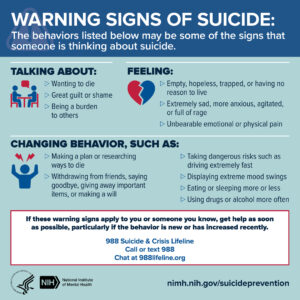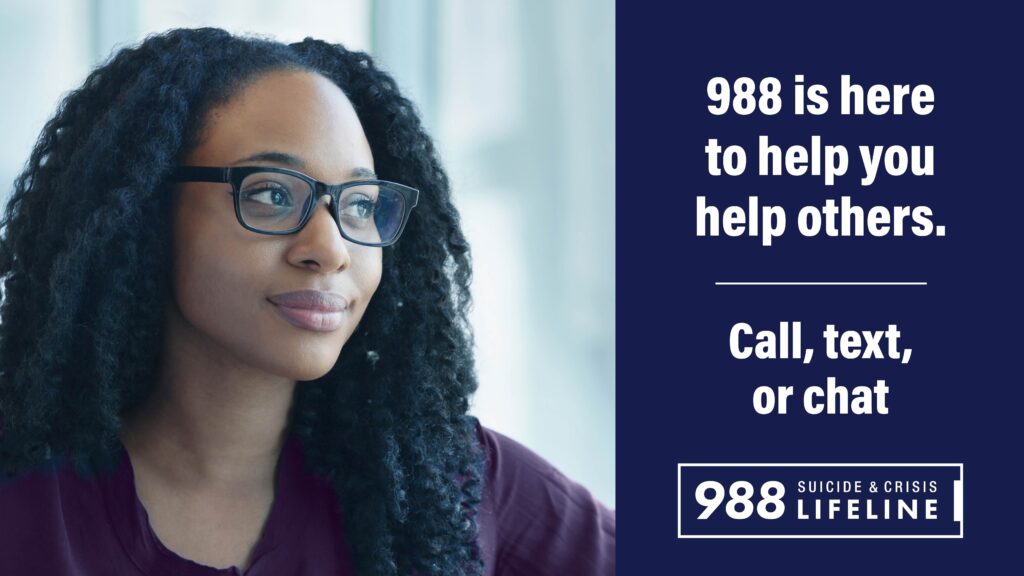September is Suicide Prevention Awareness Month
September is suicide prevention month and while suicide can feel overwhelming, learning more about it and what to do if you or someone you know experiences suicidal thoughts can make it easier to approach. Affinia Healthcare Director of Behavioral Health and Psychiatrist Dr. Juee Phalak has provided pertinent information about suicide, how to recognize warning signs and resources for help.
What is suicide?
Active thoughts of suicide involve clear and specific thoughts about suicide or plans to take your own life.
But suicidal thoughts can also take a less-defined shape. Maybe you don’t have an actual plan to die, but you:
- have frequent thoughts about death and dying
- have spent time thinking about ways to die
- believe you don’t deserve to keep living
- wish you could simply stop living
Suicide is when people attempt to harm or harm themselves with the goal of ending their life.
Suicide is the 11th leading cause of death in the US. Suicide is the 16th leading cause of death in Missouri, resulting in three people dying every day by suicide in the state.
Suicidal thoughts and behaviors should be considered a psychiatric emergency.
Does asking someone about suicide put the idea in their head?
No. Studies have shown that asking people about suicidal thoughts does not cause or increase such thoughts. Asking someone directly, “Are you thinking of killing yourself?” can be the best way to identify someone at risk for suicide.
Who is at risk for suicide?
People of all genders, ages, and ethnicities can be at risk for suicide. The main risk factors for suicide are:
- A history of suicide attempts or family history of suicide
- Depression, other mental disorders, substance use disorders, or chronic pain
- Serious illness such as chronic pain
- Sense of hopelessness
- Housing issues, unemployment, financial stressors and legal concerns
 Warning signs of people at risk for suicide:
Warning signs of people at risk for suicide:
- Talking about wanting to die or to kill oneself
- Talking about feeling trapped or feeling that there are no solutions
- Talking about being a burden to others
- Increasing the use of alcohol or drugs
- Acting anxious or agitated, behaving recklessly
- Looking for a way to kill oneself, such as searching online or buying a gun
- Withdrawing from family and friends or feeling isolated
- Giving away important possessions
- Saying goodbye to friends and family
- Displaying sudden and uncharacteristic calm
Now that we know what and who is at risk for suicide, what can we do to help?
As we learned earlier, asking about suicide does not put the thought or desire into someone’s head. So if you suspect that a family member or friend may be considering suicide, talk to them about your concerns. You can begin the conversation by asking questions in a non-judgmental and non-confrontational way. During the conversation, make sure you stay calm and speak in a reassuring tone, acknowledge that their feelings are valid, and offer support and encouragement.
What to do and how to help in a crisis:
- Take the person seriously if they express suicidal thoughts
- Remove lethal means in the area (weapons, guns, substances, etc)
- Call a suicide prevention hotline
- For general crisis support dial 988 from any phone
- For LGBTQ+ 24-hour crisis support call the Trevor Line at 1-866-488-7386
- For Black and POC crisis support call Blackline at 1-800-604-5841
- Stay with them until help arrives or take them to the nearest emergency room
Affinia Healthcare provides Integrated Mental Health Services and Integrated Behavioral Health Services for adults and children. Affinia Healthcare’s Licensed Clinical Social Workers collaborate with the Primary Care Providers, Psychiatrists and work as Behavioral Health Specialist.
A primary care clinician/physician can provide a referral to Affinia Healthcare’s Adult Mental Health services. Please call 314.814.8700 to schedule an appointment with a physician.
Parents looking for behavioral healthcare for a child, can contact our Child Development Center (CDC) at 314.814.8616. Appointments for children can be scheduled directly with the CDC. No referral is required for youth behavioral health appointments.


